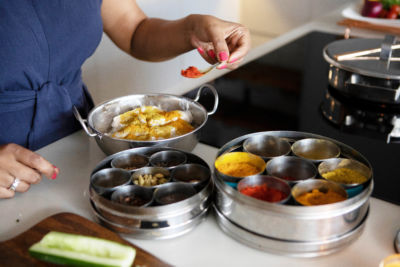It’s no secret that the food you put in your body can have a major impact on you, especially if you’re trying to lose weight or get back in shape. Better health starts with better nutrition. Certain foods can have an inflammatory effect on your gut and cause weight gain and disease, while others act as natural healers, so it’s important to explore what elements of your current diet may be detracting from your health and stopping you from feeling your best.
While it can be difficult to make a lot of major nutrition changes at once, there are smaller steps you can take within your current dietary and cooking habits that will set you on a healthier path and may even make a significant difference in how you feel.
PALM Health’s very own registered dietitian Christaney Townsend and functional nurse practitioner Sarah Bird share some of their favorite cooking tips and nutrition hacks that may help you work towards a healthier weight and happier gut.
 1. Always start your day with protein for long-term sustenance.
1. Always start your day with protein for long-term sustenance.
They say breakfast is the most important way to start the day — but really, protein is. If you lead with protein, it will provide more energy to sustain you throughout the day than if you start with a carbohydrate-based choice, like toast or a bagel. Plus, sufficient protein at breakfast and lunch will help you avoid getting overly hungry in the afternoon, which is when snacking tendencies kick in.
Nurse practitioner Sarah Bird recommends aiming for 20-30 grams of protein early in the day by adding a protein powder to your smoothie, or having a couple of eggs or Greek yogurt with veggies.
2. Sequence your foods intentionally to optimize your metabolism.
According to Sarah, you can sequence the order in which you eat your foods for the best health benefits. “Eat your veggies first, then proteins, then carbohydrates,” Sarah recommends. “This will keep your blood sugar from spiking after a meal and ensure that you get your full servings of veggies before anything else.”
Planning your nutrition specifically with your body’s biochemical pathways in mind is called biohacking. Learn more about biohacking here.
Ideally, you should be eating five servings of vegetables each day, so using this approach, consider ordering vegetables as an appetizer when eating out, or serve them at home as an appetizer or first course. This will give you a jump-start on getting your five daily servings in.
 3. “Eat the rainbow” to promote a healthy gut.
3. “Eat the rainbow” to promote a healthy gut.
One of the most important elements of weight management and overall health is maintaining a strong gut microbiome. You can promote a healthy gut by incorporating all different colors and types of produce in your diet.
Try to add in one new fruit or veggie every week for a few months, and try out new recipes to keep it interesting. Simply adding new varieties of produce will increase your microbiome diversity and significantly strengthen your gut function.
4. Steam your veggies for nutrient preservation.
There are several great ways to prepare your veggies — most commonly, pan searing or roasting. But according to dietitian Christaney Townsend, “Steaming vegetables is one of the best cooking methods because it preserves the most nutrients.”
Though roasting and pan-searing are still worthwhile cooking methods, it’s easier to overcook the veggies, which destroys a lot of their essential nutrients from overheating. Similarly, if you boil your veggies, avoid using too much water because the veggies’ nutrients can leach out into the water.
 5. Substitute table salt with spices for low-sodium flavor.
5. Substitute table salt with spices for low-sodium flavor.
An excess of sodium, or salt, is linked with several chronic health issues such as heart disease and high blood pressure. High sodium intake can also cause your body to retain more water, which in turn can lead to weight gain.
Did you know that only 1 teaspoon of salt contains 2,300mg of sodium, which is the recommended daily limit? To avoid excessive salt intake, Christaney recommends limiting table salt and instead seasoning your food with a wide variety of herbs and spices.
 6. Swap in healthier versions of your favorite ingredients to enhance nutritional value.
6. Swap in healthier versions of your favorite ingredients to enhance nutritional value.
Oftentimes, it’s the minor ingredients you use in your daily cooking and baking that can aggravate your gut more than you’d think and make it more difficult to lose weight or have a truly healthy diet.
Christaney shares several suggestions for healthier ingredient swaps that will make your cooking and baking better for your gut and overall health:
-
- Instead of refined sugar → Try maple syrup, honey, coconut sugar, stevia, or monk fruit
- Instead of white flour → Try whole wheat flour, almond flour, or coconut flour
- Instead of vegetable oils → Try extra virgin olive oil, coconut oil, or applesauce
- Instead of sour cream, mayo, and cream cheese → Try plain Greek yogurt
- Instead of heavy whipping cream → Try canned coconut milk or cashew cream
- Instead of butter → Try ghee butter, applesauce, mashed banana, or pumpkin purée
 7. Eat mindfully to stay in tune with your body.
7. Eat mindfully to stay in tune with your body.
We’ve all had times when we’ve eaten a big meal too fast and then felt sickeningly full, bloated, and lethargic afterwards. Overeating on a regular basis doesn’t allow your body to digest properly, and leads to a host of health issues, including weight gain and gut dysfunction.
“Don’t rush through your meals,” says Sarah. “Eat slowly, chewing your food 20 times for each bite, which is harder than you’d think.” It takes 20 minutes for the brain to register that you are full, so slowing down and being mindful of your eating allows your brain to catch up with your body and signal you to stop before you’ve overeaten.
Learn more helpful mindful eating techniques here.
You don’t have to go on a calorie-restrictive, ultra-strict diet in order to see results. It’s more about the day-to-day choices you make regarding your food selection, the way you eat your meals, and the quality and types of foods you’re incorporating.
Whether you’re trying to lose some weight, improve your gut health, or generally get on a better track with your nutrition, try adopting some of these recommendations from our nutrition experts and pay attention to the difference these little changes make in how you feel.
And, if you need a little more inspiration for your meals, check out our recipe collection for ideas.
PALM Health is an innovative, whole-person medical and wellness company that helps people reach and maintain well-being. Our experts in medicine and wellness empower people to transform their health, become more resilient, and feel their personal best in mind and body.








